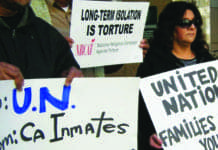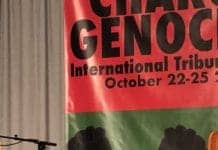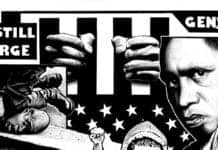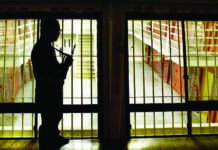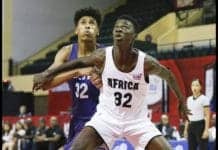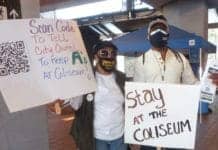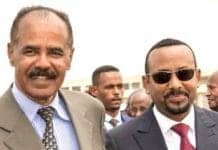by Frank LeFever

Among other things, I have learned how the 1994 Hutu genocide against Tutsis began in 1990 with an invasion by a specific group of Tutsis who grew up in exile in Uganda, an invasion with Uganda’s cooperation. I will not attempt to outline all the complexities of what happened between Oct. 1, 1990, and April 6, 1994, except to say that the story we have been told is incomplete and that Paul Kagame did not ride in like a knight in shining armor to end a genocide; indeed, some, including his former bodyguards and his former chief of staff, have even argued that he caused the genocide. The record is clear that he killed many who stood between him and his goal in his drive to seize Kigali, the capital – Hutus and Tutsis alike. Moreover, he killed more people subsequently in Rwanda and in eastern Congo – typically women, children, sick and elderly – in refugee camps or fleeing through the jungle.

Kagame, having jailed or killed people in Rwanda for saying even less than I have said about this history, is sending his agents to pursue others in Europe and here in the U.S. for the crime of simply saying that not only Tutsis but also Hutus died in 1994. One young man who is now under attack as a “bad” survivor is Claude Gatebuke.
Within the “good survivor” vs. “bad survivor” framework, certain stories from survivors are encouraged, welcomed and embraced. More often than not, these are stories that reinforce the official image of leadership and benevolence of the current Rwandan regime. They praise the current president with having stopped the genocide against Tutsis but dare not mention his crimes prior to the 1994 genocide, his crimes during that period, nor his subsequent crimes, such as genocidal crimes in later years within the Democratic Republic of Congo. Acceptable survivor testimonies are ones that dare not raise the issue of war that was being waged by the current Rwandan ruling party, a war that claimed countless Rwandan lives over the course of four years leading up to the genocide of 1994.

Within Rwanda, genocide survivors saying this are targeted with smear campaigns, often exiled and – worse – imprisoned. Deo Mushayidi, a lone survivor from his entire family, an individual with no connection to the current military dictatorship, is serving a life sentence within Rwanda. His crime? Creating a political opposition party. Raising concerns regarding countless deaths committed by the ruling regimes. Speaking out against injustice, in a stifling atmosphere, and having little or no significant community to back him up.
Many other critics have fled to exile, including journalists of independent media. One of the most high profile exiles from Rwanda is Joseph Sebarenzi, former speaker of the House, whose book Claude praises as one of the fairest among many books written about Rwanda.
The Rwandan dictatorship has gone so far as to apply their typical charge of genocide denial against “bad” survivors to descendants of survivors of the Nazi genocide against Jews. The Kigali regime dictates to descendants of Holocaust survivors that they dare not defend “bad” Rwandan survivors, as in the case of the Lantos Foundation’s award to Paul Rusesabagina.

Rwandan agents have engaged in a campaign calling her a genocide denier for simply stating the obvious – that the Rwandan government is an authoritarian dictatorship that does not tolerate freedoms. The hate for human rights activists comes from the top, as Paul Kagame has said that he doesn’t “give a damn” about organizations such as Human Rights Watch.
Clearly, Katrina Lantos Swett knows something about genocide and about shielding targets of genocide and has been quick to spot the origins and motives of the smear campaign, saying: “I think if Paul Rusesabagina had not had the determination to draw attention to some of the concerns about what’s happening in Rwanda today, none of this outpouring would have taken place. It didn’t take place when the movie came out … it’s when he began to speak out that suddenly many really questionable and unsubstantiated charges were raised.”
She is also firm in stating that the award was given not only for his doing what he did in 1994, but also for his “continued courage” in speaking out about political oppression in Rwanda: “When you have someone who emerges as a compelling voice that is an irritant to a regime, very often the regime or their supporters or proxies will go to great lengths to discredit that individual.”
“Bad” genocide survivors from Rwanda, without any political baggage or connection to the military dictatorship of Rwanda, are bullied, intimidated and harassed. They are attacked by diplomats at forums and constantly have to deal with questioning of their legitimacy as survivors, despite the trauma they’ve faced and despite the difficulty of speaking out against the regime.
“Bad” genocide survivors from Rwanda, without any political baggage or connection to the military dictatorship of Rwanda, are bullied, intimidated and harassed.
For example, the hero of “Hotel Rwanda,” who saved many Tutsis from attacks by Hutus, Paul Rusesabagina, became Public Enemy No. 1 for simply saying that Hutus also died and for speaking out against the repressive measures of the new regime. He is vilified as a “genocide denier” and as a “double genocide” revisionist – and even as a “genocidaire” intent on overthrowing Kagame and renewing the genocide!

The agents of the Rwandan government targeting Claude include a Rwandan “diplomat” at the U.N. by the name of Olivier Nduhungirehe, who also goes by the name of Theoneste Rwemalika (translated in English to mean one who kills instantly with one shot). The reasons for attacking Gatebuke include his criticism of the dictatorship in Rwanda as well as his vocal support for peace in the DR Congo and his denouncing of perpetrators of war crimes, crimes against humanity and even possible genocide against more than 5 million Congolese people. The U.N. Mapping Exercise Report for DR Congo released on Oct. 1, 2010, provides evidence for every claim Claude makes about the atrocities in Congo.
Gatebuke demands justice for the victims no matter who they are or where they are from and regardless of the perpetrators and is consistent in this in every forum. This is exactly the reason why the government of Rwanda and their supporters are targeting Gatebuke and denying his story of survival. Had he praised the policies of the Rwandan government or at least remained silent, no one would target Claude with hate speech in an attempt to stop his work.

The Kagame dictatorship’s agents do not limit themselves to verbal smears, vilification and outright lies in public forums and incessant propaganda encouraging hatred for dissidents – especially “bad” survivors. The regime in Kigali led by Paul Kagame is notorious for brutal attacks against those who disagree with them or denounce their crimes.
Many other critics have fled to exile, including journalists of independent media. Those who are in Rwanda are not as fortunate. Journalist Leonard Rugambage was shot dead as he was planning to break a story of the Rwandan regime’s involvement in the assassination attempt in South Africa, while Andre Kagwa Rwisereka, vice president of an opposition party, was found with his head severed and a machete lying next to his dead body. Journalists Agnes Nkusi Uwimana and Saidath Mukakibibi are in jail for 17 and seven years respectively for writing critical reports of the president, while virtually every opposition leader is in jail, including genocide survivor Deo Mushayidi, Victoire Ingabire Umuhoza and Bernard Ntaganda, among others.
The question before us now is: How can we help Claude and Joseph and Paul and Deo and so many other courageous “bad survivors” survive Kagame’s current and future deadly attacks?
Frank LeFever is a retired neuroscientist, a director and past-president of the New York Neuropsychology Group, a non-profit scientific and educational corporation which he helped found in 1979, a member and frequent presenter at annual meetings of the Society for Neuroscience and of the International Neuropsychological Society. He is also active in the governance of Pacifica Foundation’s New York City station WBAI-FM and of The New York Academy of Sciences Psychology Section. He can be reached at fflefever@yahoo.com.
First of three videos:
Rwanda Genocide survivor Claude Gatebuke breaks his silence and speaks on behalf of millions of Congolese victims.
On March 2, 2011, the African Great Lakes Advocacy Coalition (Africa Faith and Justice Network, Friends of the Congo, Foreign Policy in Focus, African Great Lakes Action Network, Foundation for Freedom and Democracy in Rwanda, Congo Global Action Coalition, International Humanitarian Law Institute of St. Paul, Mobilization for Peace and Justice in Congo) held a Congressional briefing for members of the Senate and House and their staffs in order to raise the profile of the U.N. Mapping Exercise Report and its implications for U.S. policy in the Democratic Republic of the Congo and the region.
This report, released on Oct. 1, 2010, documents “the most serious violations of human rights and international humanitarian law committed within the territory of the Democratic Republic of the Congo between March 1993 and June 2003.”
Human Rights Watch Executive Director Kenneth Roth says, “If followed by strong regional and international action, this report could make a major contribution to ending the impunity that lies behind the cycle of atrocities in the Great Lakes region of Africa.”
State Department Assistant Secretary for the Bureau of Public Affairs Philip J. Crowley said, “The United States is firmly committed to helping the DRC and other nations in the region take positive steps to end the corrosive cycle of violence and impunity.”
The speakers on the panel included Jacques Bahati of Africa Faith and Justice Network, Nita Evele of Congo Global Action Coalition, Nii Akuetteh, Africa Policy Analyst, and Claude Gatebuke of Africa Great Lakes Action Network and Rwanda Genocide survivor. The panel was moderated by Emira Woods of Foreign Policy in Focus at the Institute of Policy Studies. Kambale Musavuli of Friends of the Congo told the audience the report needs to be considered by members of Congress to address justice and stability in the Congo and Great Lakes Region of Africa.
Rwandan activist and genocide survivor Claude Gatebuke was among the speakers at the National Press Club on Aug. 3, 2010. The press briefing was organized to denounce the “sham” elections about to take place on Aug. 9 in Rwanda.
Speakers were Paul Rusesabagina, Hotel Rwanda Rusesabagina Foundation, who sent a written statement, as due to medical reasons he was unable to attend; Peter Erlinder, International Humanitarian Law Institute of Minnesota, William Mitchell College of Law; Pascal Kalinganire, Organization for Peace, Justice and Development in Rwanda and Great Lakes Region (OPJDR); and Claude Gatebuke, Rwanda Genocide survivor and activist.
President Obama said, in his 2009 speech in Accra, Ghana, that America should support strong institutions and not strong men. However, in the case of Rwanda, this has been no more than rhetoric. Rwandans, like most Africans, cheered Obama’s election, hoping that it might signal a new, more peaceful and cooperative relationship between the U.S. and Africa, but Obama has expanded AFRICOM, the U.S. Africa Command, and now he remains silent as Rwanda’s strongman, President Paul Kagame, prepares a sham presidential election to retain his brutal grip on power.
We are calling on President Obama and the U.S. State Department not to recognize the legitimacy of Rwanda’s upcoming Aug. 9 election results and to stop militarizing Africa and supporting repressive regimes.
Critics of the Rwandan government are urging the Obama administration to withdraw support from President Paul Kagame. Voice of America’s Carolyn Turner reports (in this video posted to YouTube Aug. 6, 2010).

 Store
Store



